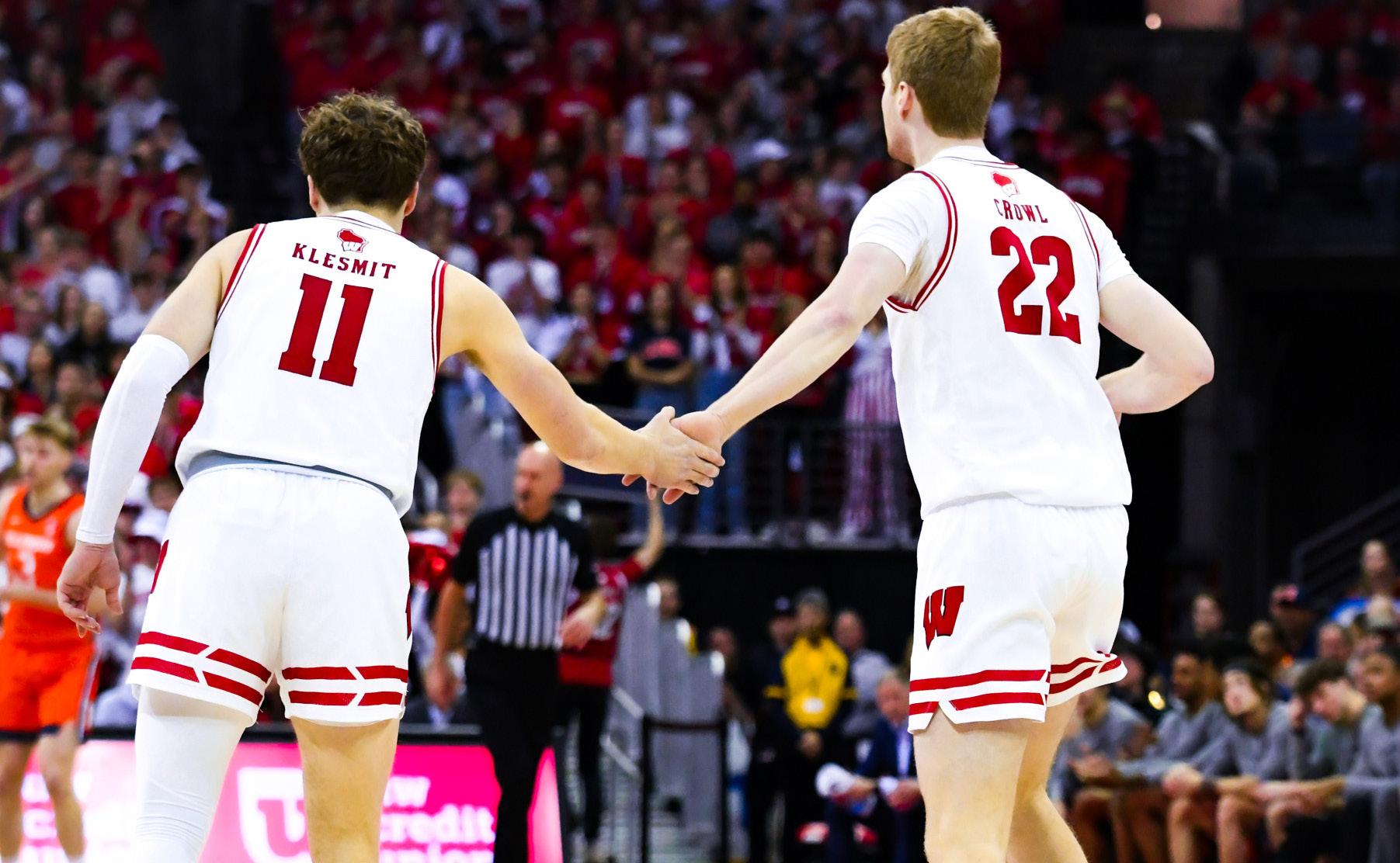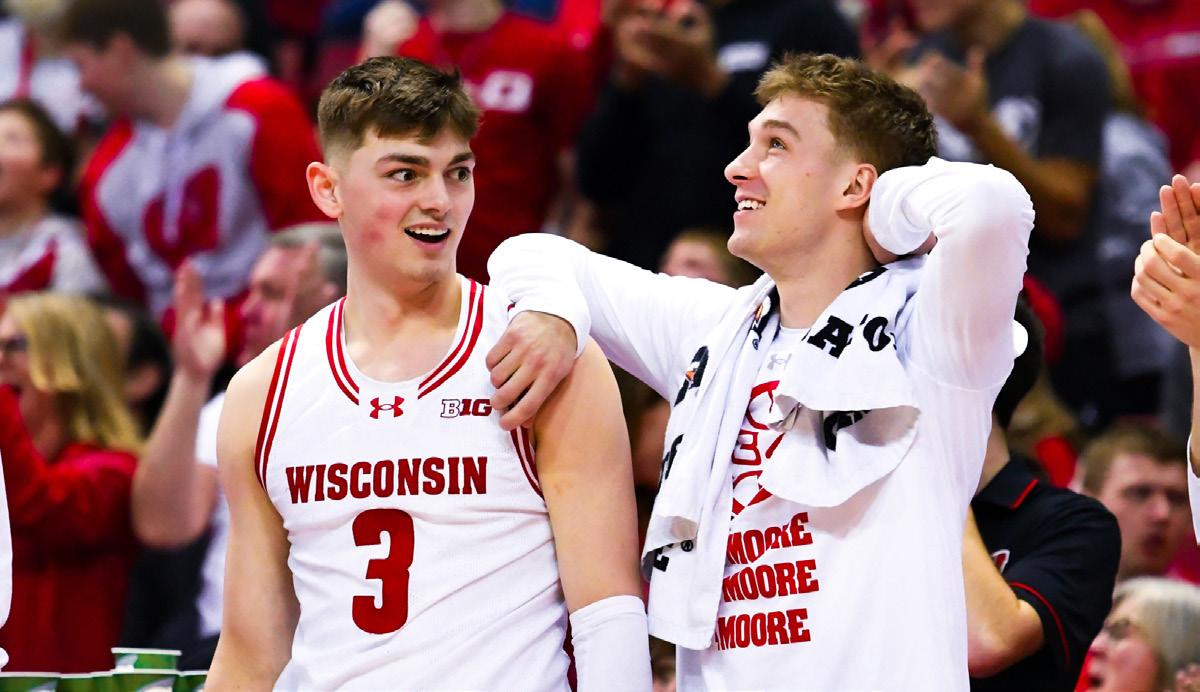
LET THE GIRLS GO TO SPACE!
Don’t listen to the haters: “The Marvels” is filled to the brim with heart and skill.


PREDATOR TO PREY
The Badgers crashed and burned in February. Here’s what they need to turn things around in March.


Don’t listen to the haters: “The Marvels” is filled to the brim with heart and skill.


The Badgers crashed and burned in February. Here’s what they need to turn things around in March.
Starbucks announced last month it will begin bargaining with workers at its unionized stores in addition to distributing raises and other benefits to employees.
Starbucks’ Chief Partner Officer Sara Kelly said in a Feb. 27 press release that Starbucks is discussing “a fair process for organizing and the resolution of some outstanding litigation” with workers represented by Starbucks Workers United, the largest labor union for Starbucks employees.
“There is a lot of work ahead, but this is an important, positive step. It is a clear demonstration of our intent to build a constructive relationship with Workers United
in the interest of our partners,” Kelly said in the release.
Workers United called the decision “a clear demonstration of a shared commitment to working collaboratively and with mutual respect” toward baristas in a statement.
State Street Starbucks shift supervisor Matthew Cartwright said he was optimistic yet hesitant that bargaining will accomplish fair treatment from Starbucks.
“We’re very excited for it, we’re very hopeful, and we always have to maintain that we believe the company will do the right thing. We hope they will, regardless of their track record, which has not always proven that,” Cartwright told The Daily Cardinal. “It’s a cautious optimism.”
Allie Kerr, a barista who helped organize the State Street union, echoed Cartwright’s sentiments.
“My first thought when I heard the news is how excited I am for our partners at the Cap Square store and many of the other stores who have had credit card tipping, wage increases and other benefits withheld from them since they organized,” Kerr told the Cardinal. “This gesture means a lot and indicates that Starbucks may be ready to truly come to the table.”
Like Cartwright, Kerr said she is still “cautiously optimistic” about the news, given Starbucks has “definitely backtracked before” when bargaining with unions.
Barista Mona Kemstra was more confident about the possibilities stemming from
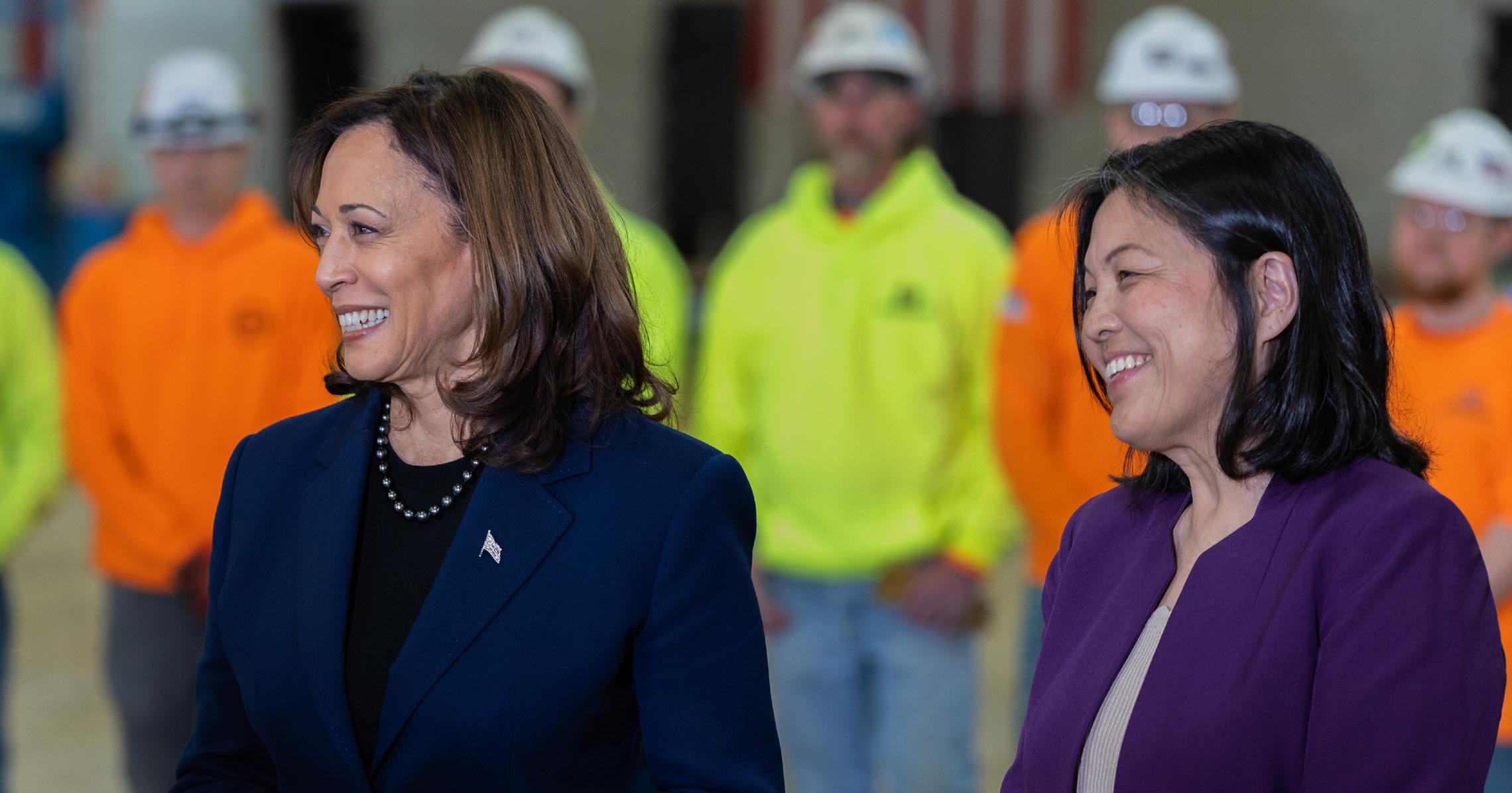 By Anna Kleiber & Marin Rosen ARTS EDITOR & CITY NEWS EDITOR
By Anna Kleiber & Marin Rosen ARTS EDITOR & CITY NEWS EDITOR
Vice President Kamala Harris visited Madison on Wednesday to amplify the Biden administration’s labor union initiatives and announce a new executive order expanding federal apprenticeship programs ahead of the 2024 election.
Harris spoke at the construction site of the future Metro Transit Satellite Bus Facility on Madison’s east side.
“This work that we see behind us is a function of that partnership around how we can get federal dollars out to local governments and local communities in a way that they, then, invest in the talent of the community,” Harris said. “It is also an example of the fact that when we invest in the American people, including the American worker, everyone benefits.”
Harris, chair of the White House Task Force on Worker Organizing and Empowerment, was joined by acting Secretary of Labor Julie Su and Madison Mayor Satya Rhodes-Conway.
“The work that is being done here is really important to build our economy here
in Madison,” Rhodes-Conway said. “This work would not be possible without the support of the president and the vice president.”
Harris also announced a new executive order Wednesday that will help create more registered apprenticeship programs in the federal workforce, according to the White House. Registered apprenticeship programs are industry-led, career pathways where “employers can develop and prepare their future workforce,” according to Apprenticeship USA.
Additionally, the executive order directs federal agencies to preference groups that hire individuals who participated in registered apprenticeship programs when awarding contracts or projects funded by federal grants.
The order also reestablishes federal labor management forums, a tool used by union members and management to jointly address workplace concerns.
Harris said Wednesday the apprenticeship work demonstrates the Biden administration’s commitment to rebuild American infrastructure and allows people to “receive an education that is for the
benefit of the community” without having to worry about borrowing money to do so.
The U.S. Department of Labor appointed 30 members to serve on the Advisory Committee on Apprenticeship and assist the Secretary of Labor with the apprenticeship program, according to the U.S. Department of Labor. Partner4Work CEO Robert Cherry was appointed to serve as the committee’s chairperson.
“Strong apprenticeship models are a proven method to create a sustainable pipeline of skilled and talented workers in communities across America,” Cherry said in a statement.
After the event, Harris made a stop at her childhood home on the west side of Madison, where she lived from age 3 to 5, according to White House officials.
Harris last visited the state in January, when she spoke in Big Bend to kick off her nationwide “Fight for Reproductive Freedoms” tour. She also visited southeastern Wisconsin in August 2023 to tout broadband expansion and domestic job creation efforts.
Readthefullstoryatdailycardinal.com
this decision.
“I am excited to see this next step starting after the long journey it took to get here,” Kemstra told the Cardinal. “I am hopeful this will finally be the conclusion thousands of partners across the country have been waiting for, and we will be able to negotiate a contract with Starbucks to better the conditions for partners nationally.”
Starbucks has a reputation for union busting. According to Reuters, the National Labor Relations Board (NLRB) filed a complaint last December that forced the company to reopen 23 stores allegedly shut down to discourage unionization.
Starbucks was unable to provide further information about talks with Workers United.
Gerard Randall still at Tommy Thompson Center despite recent controversy
By Liam Beran CAMPUS NEWS EDITORGerard Randall, a top Wisconsin GOP official, continues to influence budgets and serve at the University of Wisconsin-Madison’s Tommy G. Thompson Center for Leadership despite a high-profile business scandal that prompted his resignation from the Republican National Convention.
Alexander Tahk, Thompson Center director, told The Daily Cardinal that Randall is still a member of the conservative-leaning Thompson Center’s public leadership board.
Randall faced widespread scrutiny after a Wisconsin Public Radio and Wisconsin Watch report in November found his nonprofit organization, the Milwaukee Education Partnership, provided vague, incomplete or redundant services on specialized no-bid contracts totalling $1.2 million since 2012. The organization, of which Randall is the director and sole employee, also falsified prominent board officers on tax returns.
Randall was first vice chair of the Republican Party of Wisconsin before becoming host secretary for the RNC. He is still listed as first vice chair on the party’s website.
Sen. Kelda Roys, D-Madison, a member of the state Legislature’s budgetwriting committee, told the Cardinal it’s disappointing Randall remains on the Thompson Center’s board despite his reputation as a “fraudster.”
Roys said she doesn’t think Randall should be allowed to remain on the board.
“You don’t want someone who is implicated in financial misdealings or fraud to be involved in budgeting for any business, whether it’s a public institution or a private entity,” Roys said.
+ Randall page 4

In March 1980, Mary Lindemann quit her fashion merchandising degree and booked a trip to The Bahamas for spring break. Sitting behind her on the plane was a man who made cheese spread for a living.
That man — Phil Lindemann — would later become her husband. She soon joined Phil to become part of the family-owned Pine River Cheese Spread legacy.
“Here I am spreading cheese for the rest of my life,” Lindemann joked. “From the time I was mar ried, or dating, I became involved in the company.”
Wisconsin hosted the annual World Championship Cheese Contest (WCCC) on Tuesday and Wednesday at Monona Terrace. The contest was founded in 1957 and occurs every two years. Cheeses from countries from all over the world — including Austria, Denmark, Ireland, Japan and Spain — competed against each other in different classes.
The Lindemanns are two of many cheese connoisseurs who biennially attend the WCCC.
There are plenty of nota ble cheeseheads who attend, including self-proclaimed “cheese king” and U.S. Rep. Derrick Van Orden. He spoke at the contest and praised cheese-making as a vital part of the Wisconsin lifestyle.
Van Orden noted cheesemaking as a vital part of Wisconsin’s economy and culture. It is the only state in the U.S. that requires a cheese license to produce cheese for commercial purposes.
“I am going to tell you I’m biased,” Van Orden said. “I’m pretty sure Wisconsin is going to be cleaning everybody’s house here.”
Who’s gouda-nough for first place?
To qualify for the WCCC, cheeses must be natural and often must follow a required list of ingredients. The compe tition divided cheeses into their appropriate classes, including baby Swiss and sharp ched dar. If cheeses do not follow the required list, they may be disqualified or moved into an open class.
Cheeses in each class are evaluated by two differ ent judges. Typically, judges are asked to preside over the cheese class they specialize in, according to former Center for Dairy Research (CDR) employ ee Juan Romero.
“That’s their every day,” Romero said. “But that’s not necessarily all; you gotta be qualified to do the job.”
in research and development in the cheese industry before retiring in 2023. He volunteers for the WCCC’s “B-Team” to stay involved with the industry.
While cheese scoring is subjected to judge discretion, all judges are required to follow a standardized point system, according to Romero. All competing cheeses start with a score of 100 points, and judges deduct points for various defects found in each cheese.
According to the WCCC’s website, deductions can be made in any area: flavor, body
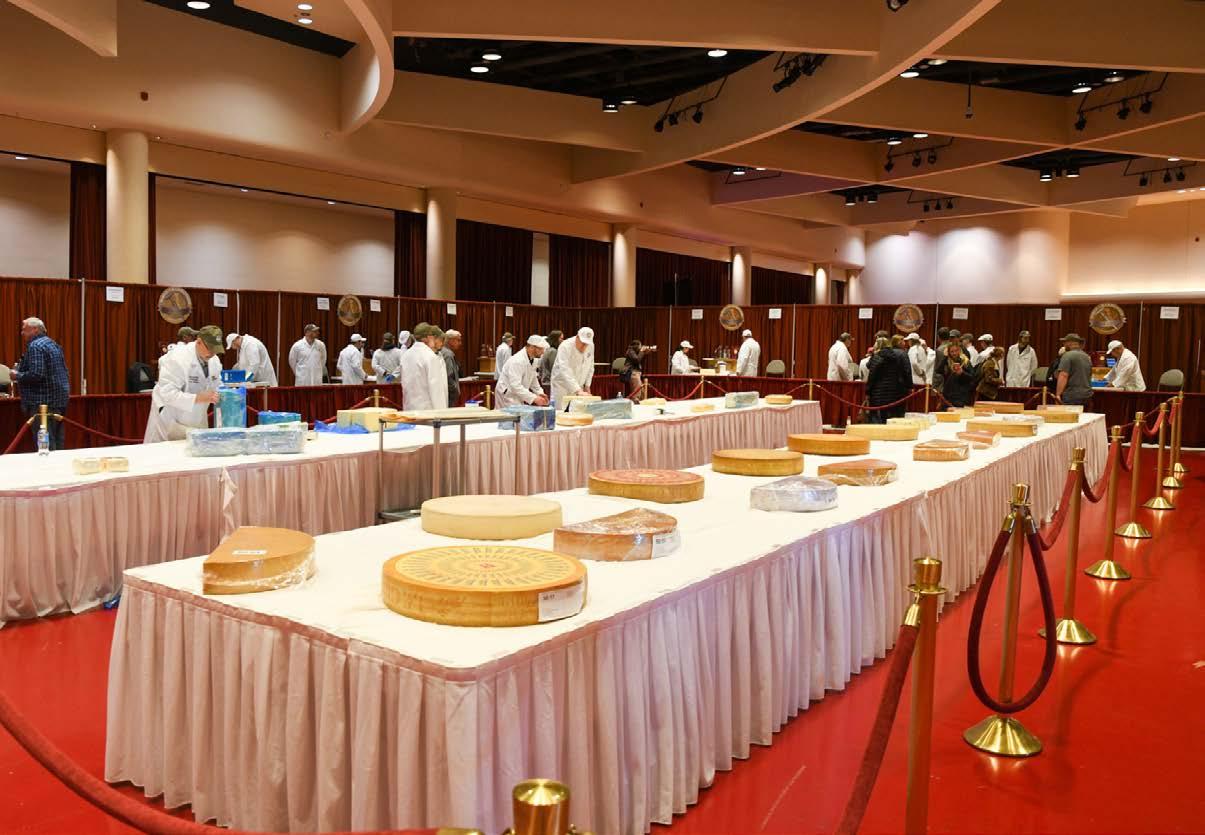

Romero said he worked for the CDR for 26 years aiding



Inspired by a t-shirt design contest, Grace Edwards wanted to make fun merch to represent Badger pride. A consumer behavior and marketplace studies major, Edwards saw the opportunity and, along with her own passion, her #BadgerDoodles quickly caught the admiration of many.
Starting with an adorable Chemistry Badger, she now endeavors to create a doodle for as many majors as she can. Edwards posts her badger designs on the popular social media platforms YikYak and Reddit and has her own virtual storefront.
Edwards sat down with The Daily Cardinal to talk about #BadgerDoodles and her mission to make affordable merchandise.
This interview has been edited for clarityandbrevity.
Your art precedes you, but can you talk a little about yourself, the artist?
I’m from a small town in Wisconsin called Wausau. I grew up there and spent a lot of time as a kid running around outside, playing with chalk on the sidewalk and catching all the animals that I could. I have a special affinity for toads in particular.
Aside from art, I’m really into hiking, and I love the National Parks. I also have a lot of houseplants — 13 as of right now — that are gradually overtaking my living room. I’ve been artistic since I was a little kid, but I started taking it a
little more seriously at 17.
How did #BadgerDoodles come about?
It was initially [for] the School of Human Ecology t-shirt design contest. I had this idea in my head for different majors, and I started thinking about the Letters and Science shirts — the university ones are pretty traditional and all red. I don’t really do red. My favorite colors are muted pastels.
Then, I came up with this whole idea of a little badger with chemistry goggles on, so that was the first one: a badger doing an experiment with goggles on.
Your art became popular on YikYak. What was that experience like?
People were actually being really cool to me on YikYak. I love how targeted YikYak is. I can talk directly to people that are roughly my age and are students. They were telling me all the different trademarks and linking me stuff. I researched a lot. Nothing I do now for my merch violates the [Bucky] trademark, as long as it doesn’t look like Bucky.
Your website lists sweatshirts for $25, significantly below the usual $40$50 range. Is affordability key for you?
Yes, because I’m a college student! I want people to actually be able to get these and enjoy them. I wanted to make something that was more accessible. I like things that are wearable.
So you’re not in this for profit?
No, I wouldn’t say it’s super financially [lucrative]. For the stickers, I make close to nothing on them because I just want people to have them. The crewnecks and t-shirts
help a little with gas and electric bills. I also have a pet snake, so I buy it a rat every now and then.
I have a job, it’s not a profit venture for me. I actually finally got a sweatshirt for myself; it’s coming in the mail. I deserve it.
What’s the creative process like for each of your doodles?
A lot of people suggest majors, and honestly, I don’t know what they are. Usually, I’ll just look up the major and look for stock clipart.
One that I didn’t really know anything about was health equity. I researched it, and there’s a scientific part and advocating for laws. My ultimate goal is that somebody who’s in that major would be able to look at it and see the little inside jokes for them.
How long does each #BadgerDoodle take you?
It totally depends: [at] shortest, 20 minutes. [At] longest, hours.
I really struggled with the neurobiology one. I had no idea what to do about that. I was like, brains! I made a lot of different versions that I hated. I settled on one that I was not super sure about, but I just posted it and asked, “How are we feeling about this?” and people really liked it! So I’m really happy I hit the right cord.
What’s your favorite #BadgerDoodle?
My favorite BadgerDoodle is whichever one I just finished, usually, but most probably the one I made for my own major — the consumer behavior marketplace studies one. He’s got different colored shopping bags, just carrying them on his tail. It’s very cute.
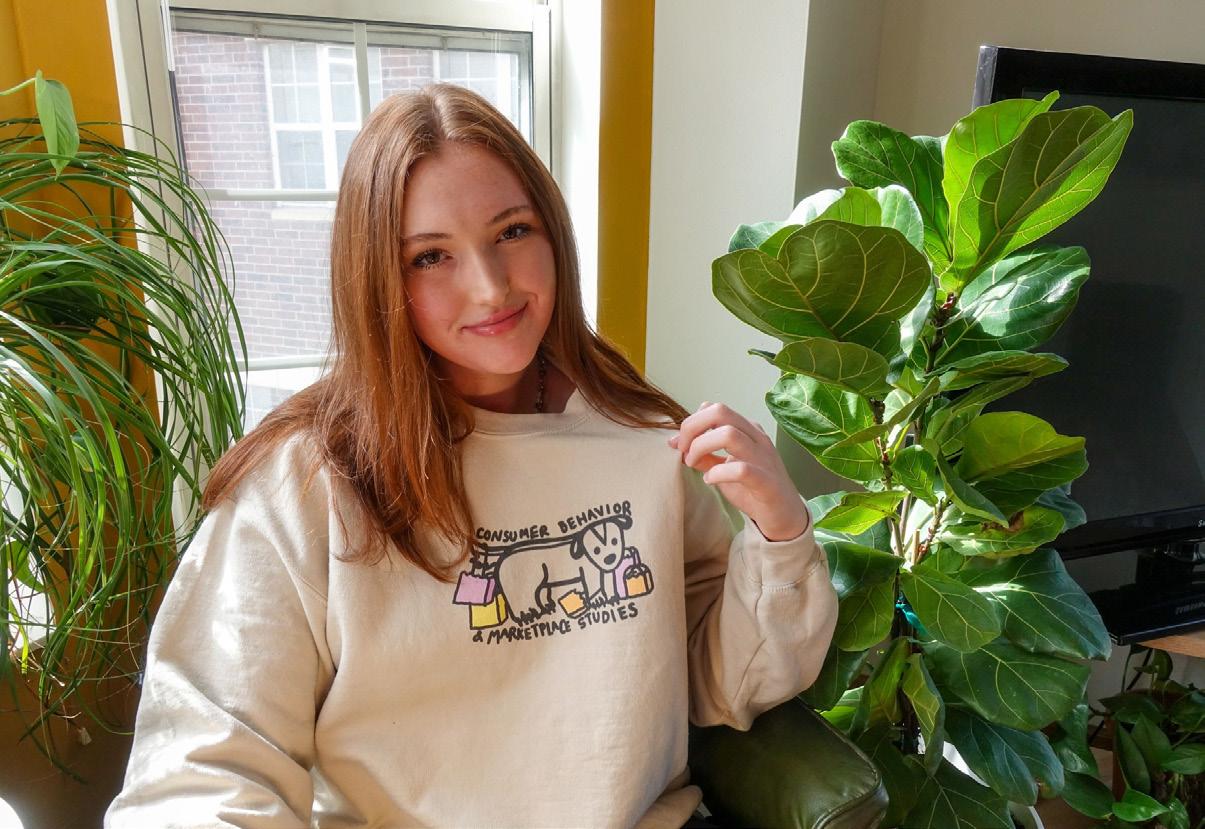
Do you get negative comments?
I have gotten hate comments, actually, on both YikYak and Reddit — mostly people giving me [unsolicited] advice on how I can do my drawings better, like, “Actually, that’s not how badgers look.” And I know! I can google a badger too! Contrary to popular belief, I’m not going for scientific accuracy. They’re just supposed to be silly and funny.
I’ve gotten private messages saying that they’re not right or bad. It’s pretty funny, I respond to everything with kindness, and usually they feel bad and remove their comment. Kill them with kindness, it really does work.
Do you see yourself doing this long-term? That’s the dream. It’s honestly surreal that anybody cares. I’ve been putting stuff out like this for a really long time. Before
BadgerDoodles, I did Toads on Roads, a series of art I did with smiling toads.
A small mom-and-pop boutique would be amazing; [I could] do TikTok Lives, I [could] give away stickers. That’s my longtime dream. I just love seeing my art places, and by far the most rewarding thing is that people want to wear it. It is really a dream come true for me and so dang affirming.
What do you have to say to your fans?
It’s really cool seeing people rally behind me like this. It’s just been amazing, and they don’t know anything about me personally. I’m just BadgerDoodles, and I kind of prefer going by that. It’s been surreal, and I’ve been so thankful for it. I just want to say thank you for everything — it’s been one of the best things that has happened to me in a long time.
As students scramble for housing in a market so competitive that students are signing leases a year in advance, city officials continue to wrestle with a housing crisis. In 2023, Madison’s rent prices increased 14%, according to Isthmus — the largest increase for any U.S. major city.
So why are luxury units struggling to find tenants?
Madison is seeing rapid expansion of new luxury apartment complexes for the upcoming 2024-25 school year.
According to Cap Times, Dane County mayors have referred to the
housing crisis as the “defining problem of our region right now,” yet these apartments are still advertising unclaimed units as they finish construction for the fall school year.
Luxury developers have offered a variety of flash sales and giveaways in recent months through social media posts, student-received emails and other promotions.
A Feb. 27 “flash special” Instagram post from Oliv, an apartment complex near State Street slated to begin leasing this fall, offered a selection of technology from AirPod Maxes to iPads in exchange for a signed lease.
Atmosphere, another apartment complex opening this fall

near the Kohl Center, hosted a series of giveaways for Xboxes, speakers and electric scooters in December for people who shared their social media posts.
And Chapter, a new 172-unit complex on Park and Regent streets, gave away gift cards to students walking by local spots near campus.
Ellie Gardner, a University of Wisconsin-Madison freshman, said she found out about Chapter in September when its representatives approached her outside of Colectivo Coffee. She said they were giving away gift cards for the coffee shop in exchange for filling out their survey.
Gardner said she didn’t remain interested in the apartments beyond her initial interaction. Still, Chapter posted Gardner on its Instagram account. She also began receiving promotional texts from Chapter but ignored the messages they sent her.
Chapter has continued their marketing push for signing deals since then. A popup advertisement appears on the apartment’s website as of March 6 offers waived signing fees and a $1,000 Chapter gift card for people who sign a twobedroom lease.
Are these new housing projects affordable?
UW-Madison freshman Sydney Ziemniak said she noticed the discounted leases when looking for housing last fall but still felt renting a space from luxury apartments was financially out of reach.
Ziemniak said proximity was important when searching for housing, but she was unwilling to compromise on affordability.
“I want to be able to walk to all my classes and have a convenient location, [but] it felt like every time I wanted something near campus it would just be so overpriced,” she said.
A studio apartment at Chapter currently costs $1,859 per month, $691 more than the city’s average, according to Apartment Advisor. Comparable units in Atmosphere and Oliv are over $400 above average.
Gardner said the “expensive” reputation of these apartments made her hesitant to even consider renting a place close to campus.
“It’s kind of a win-lose,” Gardner said. “It’s great that we’re building more housing for students. It’s just not necessarily affordable.”
Chapter’s amenities include a fitness center, a 3D printing lab and a rooftop sundeck. At Oliv and Atmosphere, tenants have an in-ground pool and coffee shop.
But Ziemniak said she feels amenities like these are not necessary for student apartments.
“At the end of the day, you just need a place to live,” she said.
Many large, amenity-filled apartment spaces are owned by a select few development groups that own vast amounts of housing properties nationwide.
The Denver-based Cardinal Group Company is developing Chapter as their first rental property in Wisconsin. The Cardinal Group Company currently owns apartments in 39 other states.
Verve, another apartment under development, is owned by Subtext, a Missouri-based company currently building apartments of the same name in Nashville, Tennessee and West Lafayette, Indiana, according to its website.
Oliv is Core Spaces’ second apartment in Madison. The Chicago-based company also owns the Hub, an apartment on North Frances Street. Both units are located near the UW-Madison campus.
The Madison Common Council has attempted to limit the increasing construction of luxury apartment buildings near the UW-Madison campus, but current state law prevents the city from rejecting development proposals on the basis of rent prices.
New campus-area convenience store provides more than just food to customers
By Kate Eaton STAFF WRITERMadison has gained another spot for ethnic food and groceries.
Regent Mart, located on the corner of Regent Street and South Randall Avenue, took over the spot that once held a 7/11 in September 2023. The market’s coowner, Nancy, said she and her partner “own a few businesses and felt the need for something like this over here.”
me to feel more connected and at home while being far away,” Ho said.
Regent Mart is not just a grocery and convenience store. It also sells freshly made ethnic foods, Nancy said.
When Regent Mart first opened, they only offered sushi and samosas as freshly made menu items. It has since expanded its menu to include more made-to-order and pre-made options.
Regent Mart currently offers multiple different cuisines including Asian, Indian, Tex-Mex, Jamaican and Thai foods.
Customers can choose from an array of items including paneer makhani, boba, chicken curry, spring rolls, Indian pao buns, butter chicken, Jamaican patties and more. Regent Mart also has sections of the store dedicated to grocery shopping for these different cuisines.
While the new market may seem like any other convenience store, University of WisconsinMadison students, such as freshman Christina Ho, said they feel the market’s cuisine makes them feel at home.
“For me, the authenticity of the food at Regent Mart allows
Randall
Through the Thompson Center’s public leadership board, Randall provides input and direction on the $1.5 million budget the Thompson Center operates under annually.
Tahk said Randall is the designee of the Thompson Family Charitable Foundation’s president, former Republican Gov. Tommy Thompson. That means Randall serves a permanent term, unlike other three-year term board appointees.
Other board members include:
• Wisconsin Assembly Speaker Robin Vos, R-Rochester
• Kimber Leidl, a senior policy advisor for former Gov. Scott Walker and current state government relations manager for Lexia Learning
• Dean Stensberg, former executive assistant to former Wisconsin Supreme Court Justice Patience Roggensack
• Jason Thompson, a partner at Michael, Best, and Friedrich LLP
• Scott Jensen, a senior strategist for school-choice organization American Federation for Children
The board also handles the Thompson Center’s budget approvals and approves expenditures for grants to proposed recipients. With board permission, the Thompson Center’s director can make substantive budgetary changes.
The Thompson Center allocates at least $500,000 annually for speakers to non- UW-Madison campuses, provides faculty grants and distributes student scholarships, among other expenditures.
Randall’s work at the Thompson Center also intersected with his involvement in RNC planning. Months prior to his resignation, Randall was described in a June 8, 2023 meeting as the point of contact for Thompson Center staff to arrange a “reasonable” speaker to come to UW-Milwaukee during the July 2024 RNC.
At the center of Randall’s recent controversies is the Milwaukee Education Partnership, a nonprofit education organization dedicated to
Although Nancy said Regent Mart does make much of its food in-store, some of the options are brought in from various suppliers within the community. The market currently partners with Thai Noodles and Arods Tex-Mex to provide customers with a variety of ethnic cuisines.
boosting teacher retention and student achievement. Its website showed a host of outdated information as of March 2024, with the last available monthly report filed in August 2017.
Randall involved the Thompson Center in at least one instance of his organization’s work for Milwaukee Public Schools.
The Thompson Center hosted a Dec. 13 webinar featuring the National Center for Teacher Residencies’ “successful educator development program for African American males.” Randall cited the activity in a quarterly financial summary he provided to the Milwaukee Public School board, according to WPR.
Following WPR’s report, Milwaukee Public Schools cut ties with the Milwaukee Education Partnership. Randall later resigned from his position as 2024 RNC host committee secretary in the same month.
Thompson Center leaders aren’t calling for resignation
When asked about Randall’s controversies, Tahk said he doesn’t generally provide assessments of members of the Thompson Center’s Public Leadership Board or Faculty Advisory Committee or activities outside the Thompson Center.
Tahk said it would be “inappropriate” for him to comment on who should or shouldn’t serve on the board, given his service as director.
“I appreciate Mr. Randall’s service and contributions on the Public Leadership Board,” Tahk said. “No one has expressed concerns to me.”
When asked if he believes Randall should resign, Thompson Center board member Scott Jensen told the Cardinal via email he’s grateful for Randall’s continued service to the board and called him a “very valuable member.”
Other board members did not respond to requests for comment.
Although Roys said proper accountability procedures for a Thompson Center removal should take place, that doesn’t mean, in her view, that Randall should remain in the “prominent” position.
“He has no right to be on the board,” Roys said. “It doesn’t speak well of the leadership that they’re allowing this to continue, given what has already been pretty strongly established about his other mistakes.”
Brelynn Bille, a Morgridge Center for Public Service intern and
Since opening, Regent Mart said they have experienced an overwhelming amount of love via online reviews about the shop’s food and environment.
Nigel Yu, a freshman at UW-Madison, said Regent Mart is a staple in his diet. Yu is part of a sailing team that meets near the
UW-Madison La Follette School of Public Affairs student, questioned whether Randall’s pattern of being involved with organizations whose funds that are “meant for one thing seemingly disappear or are not properly allocated” made him a proper fit for the Thompson Center.
“Any person could see that this pattern is detrimental to the organizations he has been involved with in the past,” Bille said. “It seems like a clear red flag to the rest of the center’s board that he should resign or be removed before similar situations arise.”

said often brings him to the market for a meal.
The Thompson Center was created in 2017 by Republicans on the state Legislature’s budget-writing committee and distributes grants for faculty research on public leadership. It also hosts outreach events across many UW System campuses.
The center is nonpartisan in legislative language. However, when announcing the center in 2017, Vos said he hoped it would “offset” liberal thinking at UW System campuses.
Questions around the Milwaukee Education Partnership aren’t the first time Randall’s work
said. “They have fresh food almost every single day, it’s always a great assortment and very diverse types of foods.”
has faced backlash.
In 2001, Randall faced criticism for inaccurate reimbursement claims — which were tied to retreats and restaurant visits — during his time as CEO of the Private Industry Council, a position former Milwaukee County Executive Thomas Ament appointed him to in 1998. That led to a 2007 ouster from the position and the city taking over the council, according to the Milwaukee Journal Sentinel.
Randall did not respond to requests for comment.

READY. SET. SUMMER. ATLANTIC CITY • MAYS LANDING • CAPE MAY | NEW JERSEY This summer you can earn transferable college credits in as little as six weeks! Affordable online & in-person classes start May 20. Register now at atlanticcape.edu
Regent Mart, something heNavigating social media is inherently challenging, and having an online following adds an extra layer of complexity. But Killian Weston, a University of Wisconsin-Madison freshman and content creator, has deep experience managing a large online audience.
Weston is predominantly known for his presence on TikTok @_killianweston_, where he has amassed a following of over 275,000 users. He first went viral in high school but is best known for his college-centered content. His videos are funny and are generally well-received by both students at UW-Madison and his broader young adult audience.
However, anyone with a large social media presence has people who don’t enjoy their content, and Weston is no exception to this. Comments like “You’re ruining UW-Madison” may seem outrageous to others, but the underlying sentiment behind those words is incredibly personalized for Weston.
Given his close ties to UW-Madison, the emotions people attach to his videos —
whether positive or negative — translate to the way he is treated on campus.
“I have started to realize the connection between the social media presence and the real-life presence have very strong ties, especially with people who like to act out and lash out against me,” Weston said.
Weston was recently targeted because of his social media presence. He said he was drugged by someone he was familiar with while at a local spot with friends and was put in an incredibly dangerous situation as a result of his online following. Weston said he is ok after the attack, but the incident highlighted an example of the toll a large-scale social media following takes on overall well-being.
An incident as extreme as the one Weston experienced is not an inevitable result of a largescale social media presence. However, it does demonstrate how being in the public eye — particularly within a campus environment — can disrupt an individual’s ability to maintain a sense of normalcy.
Being in such close proximity to his fan base, Weston has the opportunity to interact with
people who both idolize and hate him for his social media presence. However, Weston said the person in his TikTok videos isn’t precisely “him.”
“The TikTok me isn’t actually me. I may be funny, try to be funny when I am myself, and I wouldn’t say the Tik Tok thing is a facade, either. I would differentially be a part of me but it’s definitely more of a character,” Weston said.
Weston doesn’t always display the same demeanor as he does in his videos, and he said he has repeatedly been told he comes across as “nicer” in person than compared to his online persona.
Despite the toll social media takes on a creator’s mental health, Weston said he felt fortunate to have the opportunity to create content that people enjoy.
“I just want people to know that I am just a student guy that’s just trying to brighten peoples’ day and also build up a strong following and connection with people,” he said.
What’s more, Weston is a proud Badger and uses his platform to build connections with other notable figures at the school. He said he has close ties
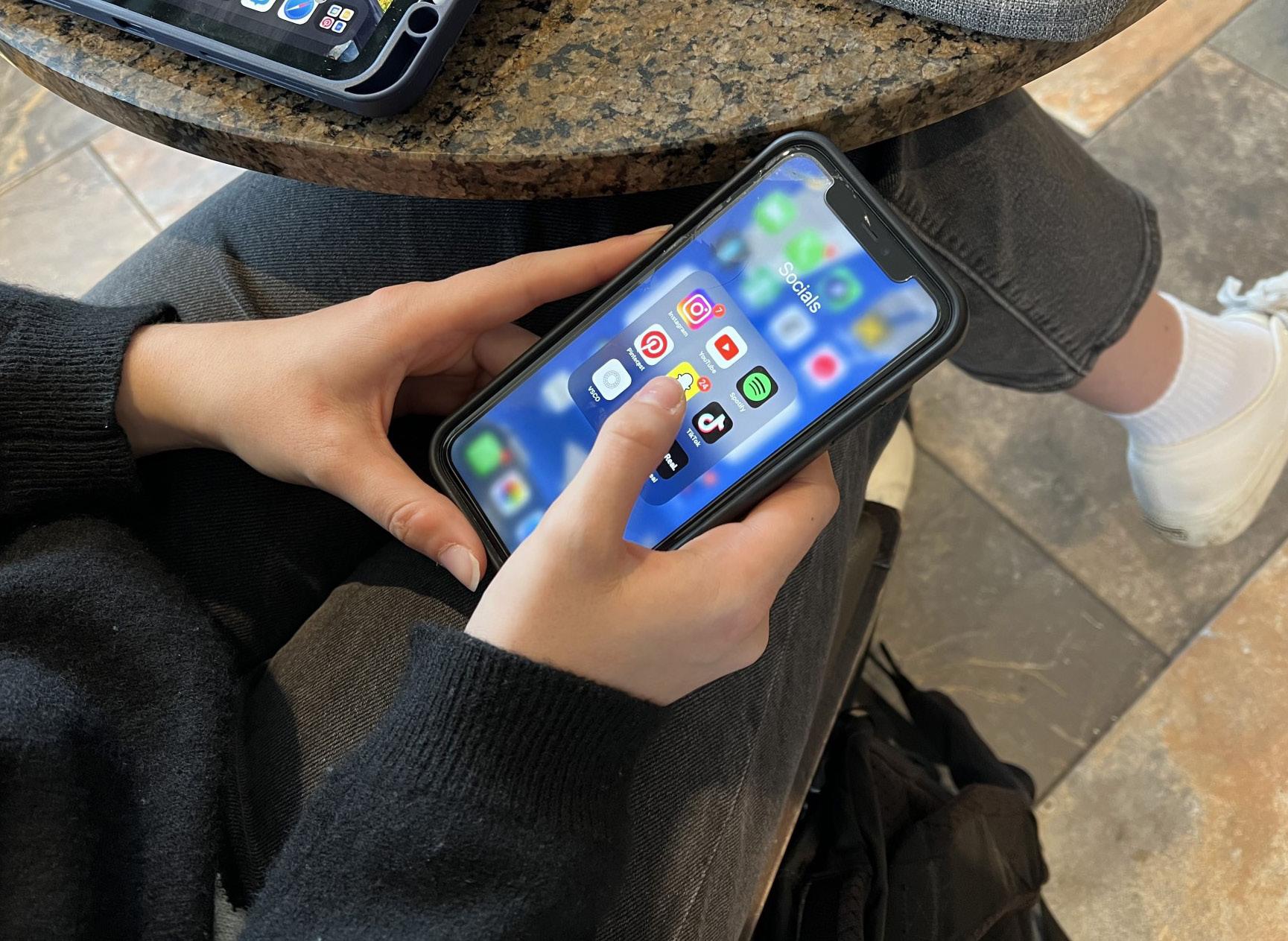
with the Bucky accounts, and he has been able to reach out to athletes on both the football and women’s volleyball teams.
Weston said he feels lucky that his audience is so heavily dominated by students at UW-Madison and worldwide. He said he likes being able to make his content relatable to other students in a way that makes them feel seen.
“To have the TikTok thing to add on to me being a student here is something that is so important to me,” he said. “I have gotten to do such cool stuff
that makes me so proud to be able to go to school here.”
Social media is often clogged with negativity. As fake as social media can feel, the impact it has on users’ well-being is all too real. It invites warped perceptions of others, and this is true for individuals with platforms both big and small.
Weston reminds all of us of an important lesson: No matter how big or small an individual’s platform is, we need to recognize there is a person behind the screen.
Harvard can’t make up its mind on Claudine Gay. Universities need to look another wayBy Lauren Stoneman OPINION EDITOR
You may have been surprised to read the name Claudine Gay in this headline. After all, it has been a few months since Gay stepped down as president of Harvard University, and the dust surrounding her tenure and resignation has largely settled outside of the Harvard community.
It’s in the wake of her presidency, however, that a new question emerges: what comes next? What should Harvard — and collegiate institutions more broadly — take away from the downfall of a president who over-promised and under-delivered?
Harvard knew what they wanted from Gay’s presidency. As the first Black woman to lead the university, they expected a president who could champion the interests of underrepresented groups on campus and serve as Harvard’s proud face to the outside world.
Instead, she will be known for having the shortest presidential stint in Harvard’s history. She will be remembered for nearly 50 instances of plagiarism and inadequate citations across eight of her published works. In conversations about a Dec. 5 congressional hearing, she will be recalled for her failure to address whether calling for the geno-
cide of Jews violates Harvard’s student code of conduct.
Harvard knows that a lesson needs to be learned from Gay’s troubled tenure. The problem? They can’t seem to agree on what that lesson is.
In the Harvard Crimson alone, you will find a smorgasbord of opinions: the university must learn to be either less political or more political. Harvard must learn to be either more staunchly pro-Israel or more staunchly pro-Palestine. Some students argue that plagiarism accusations such as those against Gay are overstated. Others claim they are grossly understated. Some argue that Gay’s downfall is her own doing, while others implicate a larger-scale assault on higher education.
Make no mistake: it is admirable and necessary that Harvard students engage in a discourse on the future of their university, and a varied array of editorials reflects that effort. But it also reflects a broader turmoil that the university is experiencing behind closed doors.
Harvard administration doesn’t know what comes next. Should presidents remain neutral in political debates on campus going forward? Should they be encouraged to comment on the discourse? What expectations
can we hold for future leaders of the university?
In short: Harvard doesn’t know what to take away from the downfall of Claudine Gay.
This is significant beyond the four walls of Harvard. Questions about the role of leaders in higher education are important for all major universities to answer.
UW-Madison has faced its own controversies surrounding free speech on campus, administrative response to campus politics and even plagiarism. We too need to assess the expectations we hold for our university officials.
Until Harvard is able to decisively answer those questions for themselves, though, and until Harvard can decide what lessons need to be learned, we cannot look to them as a guide.
Universities like ours need to determine for themselves what lessons can be learned from Gay’s tenure.
Allow me to propose one lesson: Gay’s conduct opposed the values that Harvard University strives to uphold. She claimed the “demagogues” who pioneered her ouster undermined “the ideals animating Harvard since its founding: excellence, openness, independence, truth.”
But by failing to hold herself to the same standards of aca-
demic integrity that she expects of her students, it was Gay who undermined excellence and truth. By failing to protect a marginalized group on campus, it was Gay who undermined independence and openness. For these failures, Gay’s resignation was necessary. This is a lesson that just about every university can learn from. At minimum, we
need to trust that university leaders will abide by the university values that they claim to uphold.
You might think that these feel like empty words. Gay’s resignation proved they aren’t. They are a necessary starting point for a far more difficult conversation — one we can’t assume other universities will have for us.

Every day, tens of thousands of University of WisconsinMadison students and faculty members traverse across the city. But amid the commotion of campus life lies a thriving and diverse ecosystem of wildlife — from raccoons to cranes to even coyotes — that call Madison home.
There are many wildlife sightings on campus, many of which are up-close encounters.
Alex Nelson, a freshman at UW-Madison, said he has seen a hawk, a bald eagle and raccoons, among other animals. According to Nelson, raccoons are often seen at night around the Lakeshore neighborhood, while raptors are seen in the middle of the day.
“I saw a hawk kill a squirrel and eat it, which was very fun to watch,” Nelson said. “And also a few days ago I saw a bald eagle.”
Dr. David Drake, a UW-Madison Wildlife Ecology professor, said there is abundant wildlife on campus, including foxes, coyotes, deer, beavers and owls.
Drake said there is a pack of coyotes that live in the Lakeshore Nature Reserve and often cross Lake Mendota in the winter. Meanwhile, he said foxes live all around campus, and the first foxes found on campus had made a den underneath Van Hise Hall.
“When the fox kits first came up above ground on a sunny, warm spring day, there had to be 500 people in that grassy area just watching them,” Drake said.
Jackie Sandberg, the Wildlife Program Manager at Dane County Humane Society’s Wildlife Center, said the center sees an average of 130-150 native species every year. Raptors and songbirds are most commonly brought in from campus.
An urban landscape pro -

vides a great home for these types of wildlife, according to Drake. Urban landscapes possess both human and natural food sources, and wildlife can make homes out of humanmade buildings. Drake said wildlife use structures such as chimneys or attics as shelter. However, Sandberg warned that an urban landscape can bring dangers to wildlife. Usually, animals come into the Wildlife Center if they are injured, diseased or orphaned.
Sandberg said ducklings and other baby animals are especially vulnerable to being injured or separated from their parents because Lake Mendota and ---Lake Monona are separated by busy roads.
“Hit by car accidents is probably one of the number one reasons we see patients from the downtown area,” Sandberg said.
She added that the “closer proximity people have to wildlife, there’s usually going
to be some kind of conflict.”
This can be from using environmental spaces or from wildlife getting stuck in things humans put into the environment, such as fishing lines. Sandberg said she sees mallard ducklings most commonly at the Wildlife Center. However, American robins, painted turtles, red-tailed hawks and great horned owls are also high on the list, though it varies from year to year.
If you find an injured, sick
or orphaned animal on campus, Sandberg suggests taking a photo and sending it to the Wildlife Center to help rehabilitators identify whether the animal needs assistance.
If the animal needs help and can be safely contained, she advises calling the Wildlife Center before driving the animal to them. Additionally, she warned against giving the animal food or water because it will increase the animal’s stress level.
Discover overwintering, or how our six-legged friends stay safe in the cold.By Madelyn Anderson SCIENCE EDITOR
Have you wondered why you don’t see as many bugs on Bascom during your winter walk to class? While Wisconsin is home to a diverse collection of insects, they seem to disappear when the weather turns cold. But never fear, science is here to explain this phenological phenomenon.
Phenology is the study of nature’s cycles, which are intimately tied to the seasons. This helps scientists explain things from flowers budding to migration and more.
According to the Lakeshore Nature Preserve website, the latter is common for certain Wisconsin insect species like
the monarch butterfly and potato leafhopper.
However, the rest participate in a practice called overwintering. Overwintering describes how insects survive the winter, which happens in a variety of ways. After all, each species has unique adaptations and life cycles.
While the Smithsonian notes that not many insect eggs make it through the cold, a large number of larvae are successful. Although the insects are juvenile, they can seek shelter in soil and plant cover.
If a bug happens to be in the pupal stage, transforming to its adult body in a protected pupa, it can stay anchored to another structure and survive.
Once the creature is an adult, it has a plethora of places to stay warm, including inside trees, under rocks and more.
While hibernating helps, certain insects also have metabolic processes to ease the
freeze, including swapping the water in their bodies for glycerol and consuming large amounts of honey for heat.
A local example, spiders, comes from Mike Draney, a University of Wisconsin-

Green Bay biology professor who spoke about the subject with Wisconsin Public Radio last year. Draney said Wisconsin spiders don’t even eat in the winter, remaining relatively immobile until spring arrives.
Additionally, Wisconsin is home to many dragonflies, which exist as growing nymphs immersed in water during winter.
While it may be disappointing not to see as many insects crawling around campus, the Lakeshore Nature Preserve encourages people to look for evidence they were there. Whether it’s a mark in the snow, a pupa in a tree or the flourishing wings of a butterfly, insects are everywhere.
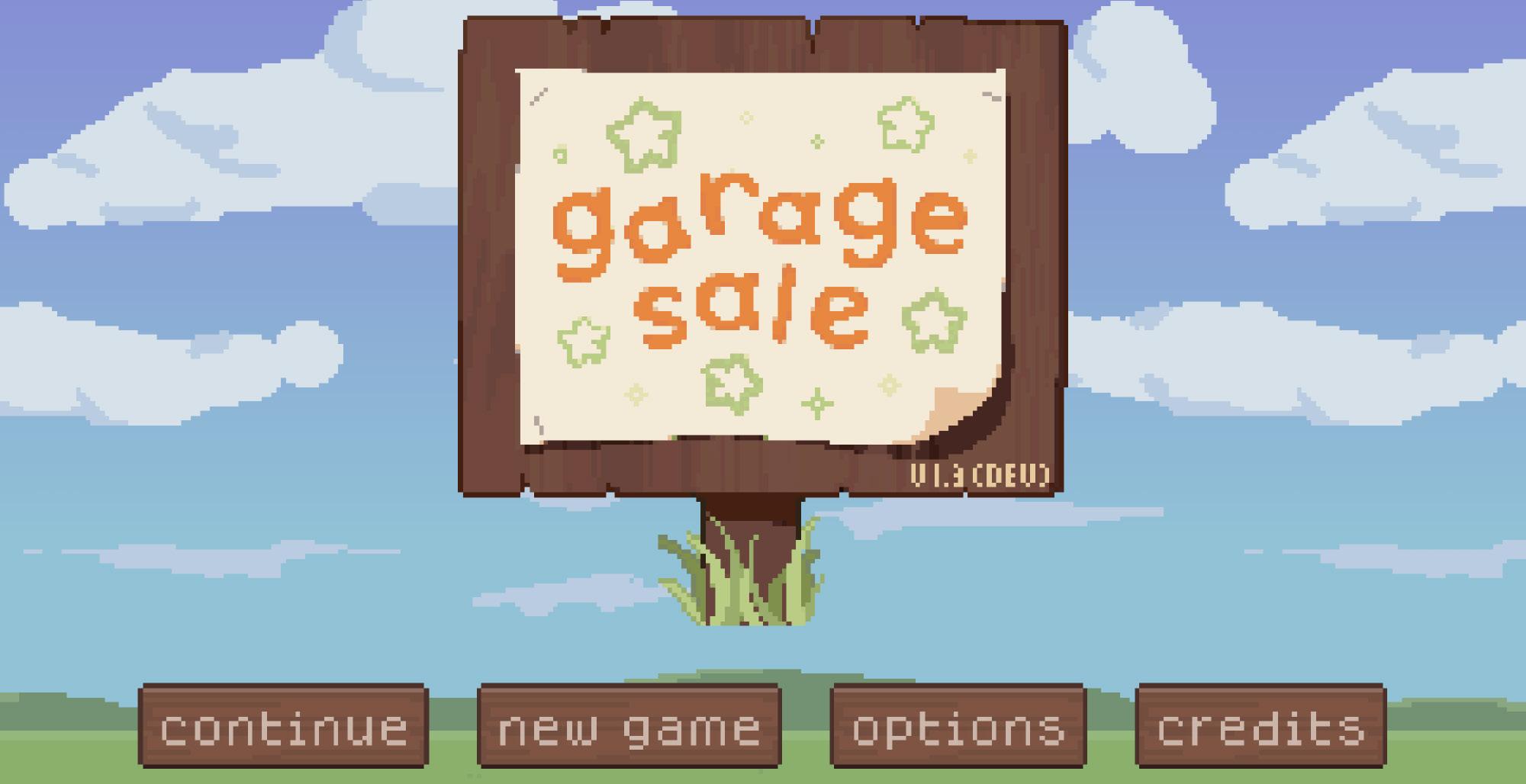 By Kaylie Wiedmeyer STAFF WRITER
By Kaylie Wiedmeyer STAFF WRITER
University of WisconsinMadison student Amelia Zollner’s junior and senior years of high school were filled with boredom and disconnect due to the effects of the COVID-19 pandemic. It was then that she was prompted to put something out into the world, intent on making her mark with an indie game titled Garage Sale.
Zollner had always taken an interest in games and turned to a lot of smaller indie games to pass time during the pandemic.
To Zollner, playing games like Undertale allowed her to feel a strong sense of community during a time when social interactions were limited.
“I was embarrassingly about five years late to the party, but when I finally got around to playing Undertale, I stayed up until 6 a.m. to finish it one night,” Zollner said. “It just impacted me in a way that I never thought any form of media could.”
Zollner said she couldn’t stop thinking about Undertale after playing the game. With Undertale at the forefront of her mind, she decided to look into the game’s creator, Toby Fox, and
discovered he made the game almost entirely by himself.
“[Fox’s] story, paired with the game’s relatively small scope, made me realize that I might be able to take my lifelong love for storytelling and put it into a game, a format which I’ve always idolized but never thought I could get into as a writer with absolutely zero coding knowledge,” Zollner said.
Using Bitsy, a game development platform similar to Scratch, Zollner began to bring Garage Sale to life.
Zollner originally intended to finish the project before she left for college, but after facing some setbacks, she decided to pitch her idea to the Game Design and Development Club (GDD) at UW-Madison after encouragement from friends.
“I feel like when I started making this game, it was going to be about moving away from a town and feeling a sense of loneliness because I was worried about meeting people at college,” Zollner said. “But when I got to college, I made so many friends and realized I could make a game that was happy instead of sad, about community and putting roots down instead of being sad about leaving.”
A team effort
Shortly after pitching her idea to the club in fall of 2021, Zollner acquired a small team of around six members. Some members of the team have come and gone, contributing with their talents when needed, but a few have stayed core members for the duration of the project. Those members include Jennifer Kim (programming and art), Josie Ronk (art and writing), Allie Carlson (writing) and Rishit Khare, the lead programmer, sound designer, composer, artist and writer responsible for the technical decisions behind the game’s development.
Khare’s programming knowledge proved to be a major asset to the group. It was Khare’s idea to recreate the game using Godot, a free and open-source game engine, widening their opportunities with the game’s development. To Khare, the switch to Godot was “a commitment to something larger in scope.”
The team also used software like GarageBand and Aseprite to help create all aspects of the game themselves, including sounds, graphics and the storyline.
Another factor in the group’s success was attending game jams, which are three-to-five day gaming
First things first: “The Marvels” admittedly has more baggage than your average film — even your average Marvel film. From a production delay that set it back a year, another that moved it from July to November 2023, the SAG strike ending on the day of the film’s premiere — meaning the actors couldn’t even speak about the film until it entered theaters — and, of course, the massive online hate campaign that marred the original film, neither production nor promotion came easy.
Those things have been addressed, and they will not be mentioned for the rest of the article because, truthfully, none of them matter. The bottom line is that this was a good film, the best Marvel movie of the year and one filled to the brim with heart and skill from its production team.
“The Marvels” introduces arguably the best team to hit the MCU
since the original Avengers: Monica Rambeau; Carol Danvers, aka Captain Marvel; and Kamala Khan, aka Ms. Marvel. All three hail from different corners of the MCU. Monica had a small part in “Captain Marvel” and a pivotal role in “WandaVision.” Carol, of course, most recently appeared in 2019’s “Avengers: Endgame,” and Kamala was recently the star of the “Ms. Marvel” Disney+ series.
Despite none of these actresses being cast with the other in mind, their chemistry throughout the film is palpable. Brie Larson as Carol and Iman Vellani as Kamala perfectly encapsulate a reluctant mentor/heroworshipper dynamic from the comics, with Vellani bringing much-needed levity in her first-ever film role.
Larson and Teyonah Parris, who plays Monica Rambeau, do the emotional heavy lifting of the film as they confront the tattered remains of their relationship from the previous film. While
marathons Khare said allow game creators to throw ideas around and create with “less pressure to catch lightning in a bottle.”
“Jams were a great experience for me to learn because they forced me to think outside the box and just create, rather than overthink or overcommit,” Khare said.
Khare said game jams taught him the value of pushing beyond the walls of perfection, which he found especially helpful when working on Garage Sale.
“With jams, since you can throw away the idea once it’s over, and they typically don’t last over a week. Everything you make is sort of trivial, and it takes the pressure off,” Khare said. “During my first jam, I couldn’t even make the deadline and never submitted my game, but I still learned so much from the process.”
Garage Sale was the first longterm project any of the members have worked on, making it a big learning process for the team.
While Zollner is the group’s director, in charge of the collaborative effort, consulting and creative direction of the game, all members brought something to the table.
“As leader and director, Amelia has been very open and flexible. She made it a point from the start of the development process that this game was everybody’s project, not just her own,” Khare said. “She would spend time and earnestly consider every concern or suggestion that was brought up to her.”
Garage Sale focuses on the narrative of a girl exploring the community-wide garage sale. The player is able to discover different parts of a forest town, complete quests and collect friends throughout. The landscape is a quaint and comforting town featuring a wide variety of rooms for the player to discover.
While Zollner said she adores a lot of mainstream classic cozy games like Stardew Valley and Animal Crossing, she said, at times “it can be frustrating
to come home from a stressful day of work and try to unwind with these games, only to be met by decisionmaking and money management that just feels like a second job.”
Zollner said she wanted Garage Sale to be an exploration-based game instead of a game that just “replicates capitalism in a cute way.”
“I took what I had learned from similar exploration-based games and drew ideas from my own childhood, my experience going to garage sales and thrift stores and flea markets and my love for things like walkable cities and tight-knit communities,” Zollner said. “Yes, you can collect coins and buy little trinkets in Garage Sale, but achievement isn’t tied to that — the real goal is just befriending your neighbors and exploring.”
Khare said the game allowed him to feel a sense of community he hadn’t felt in a while due to the pandemic.
“When COVID struck, I felt like my final years of high school had sort of been stolen from me. It was heartbreaking to have such limited contact with my friends, and things didn’t really get the chance to go back to normal before my high school friends had to part ways for college,” Khare said.
As an out-of-state student from Washington, Khare said he didn’t know too many people when he moved to Wisconsin. He said joining the Garage Sale team allowed him to build community in a new state.
“When I first saw Amelia’s pitch, the emotional themes of finding community and friendship to overcome loneliness that she was trying to emulate with her game really struck a chord with me,” he said.
The Garage Sale team has already started promoting their game on platforms such as TikTok and Twitter. The game will be published on Steam and is currently available to be wishlisted before its release.
Zollner said the group is looking forward to sharing Garage Sale at the Midwest Gaming Classic in Milwaukee this April. They plan to release it within the next few months.
there’s a notably emotionally charged scene from the trailer missing in the final cut of the film, their relationship still manages to hit in all the right ways, especially at the end of the movie.
Zawe Ashton gave it her all as Darr-Ben, the film’s villain, but there was so much happening throughout the film that it became hard to focus on her motivations. The internal conflict between the characters of this film was much more interesting than the external conflict, which left the villain’s story feeling hollow and at times unnecessary.
The true hero of this movie was the fight choreography. A main plot point of the film is the fact that, when they use their powers, our three main heroines switch places uncontrollably, which is a major conflict for the first third of the film. However, they learn to use this to their advantage after spending some time together, which gives
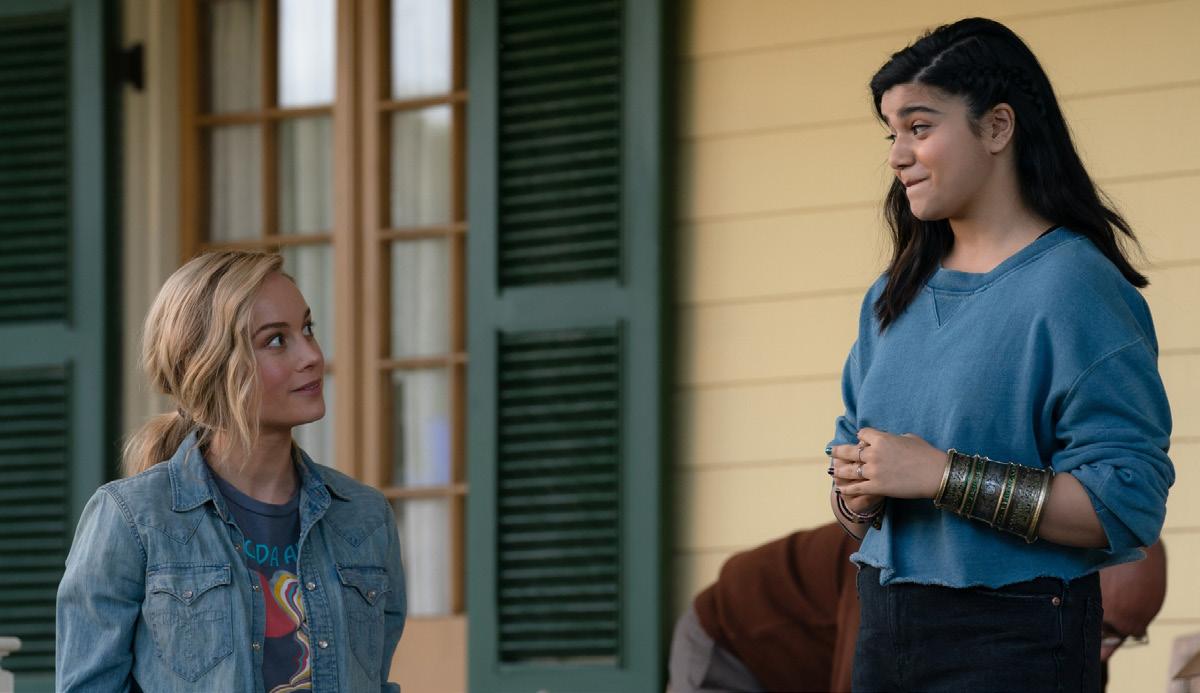
way to some of the coolest MCU fight scenes we’ve seen thus far.
As someone who was on the fence about the change in Kamala Khan’s powers from the comics to the MCU, I can safely say that this movie led me to accept them.
All in all, this is a good film.
There’s nothing objectively bad about it, and it was worth a watch in theaters just as it’s worth a watch (or two) on Disney+. This film knows who it was made for: the girls. It’s a fun road trip film about women
discovering that their true power comes when they work together.
It’s no confidence that this film, which has gained a lot of hate online, is led by three female main characters, two of whom are women of color. This is also the first MCU film to be directed by a Black woman.
I hope that these facts will ultimately be seen as a positive and that this film will finally get a fair chance.
“The Marvels” is now available onDisney+.
PHOTO COURTESY OF GARAGE SALEWisconsin women’s hockey has their eyes set on an eighth national championship, and the No. 2 Badgers are one step closer after their first-round playoff series sweep v.s. St. Thomas.
Kirsten Simms led the team to a 4-2 victory on Friday, and stellar offensive plays from multiple players on Saturday ended the Tommies’ 2023-2024 season.
The Badgers attacked fast Friday night at LaBahn Arena, scoring a goal in the first minute of the game. After a setup pass from Casey O’Brein, Simms broke through the St.
Thomas defense with a blast into the upper left corner of the net and put the Badgers up 1-0. Wisconsin’s second goal came midway through the second period when Laney Potter raced down the rink and ended her run with a clever back pass for Lacey Eden to tap into an open net. With this goal, Eden became the fourth Wisconsin player to hit 50 points this season, joining Simms, O’Brein and Britta Curl. Stillt, the Tommies made it a one-score game going into the third period.
The third period opened with competitive play, but
Simms increased the Badgers’ lead to 3-1 after redirecting Laila Edwards’ shot on frame. The Tommies again closed the gap to keep it a one-score game, but Curl eased nerves by scoring another goal with six minutes left in the game. The Badgers secured the 4-2 win, and Simms added two goals to put her at 29 for the entire season.
Saturday was more one-sided than Friday’s as six Badgers got on the scoreboard in a 9-1 win over St. Thomas.
After opening with 11 shots on goal, Curl gave the Badgers the lead when she received a pass from Edwards and slot-
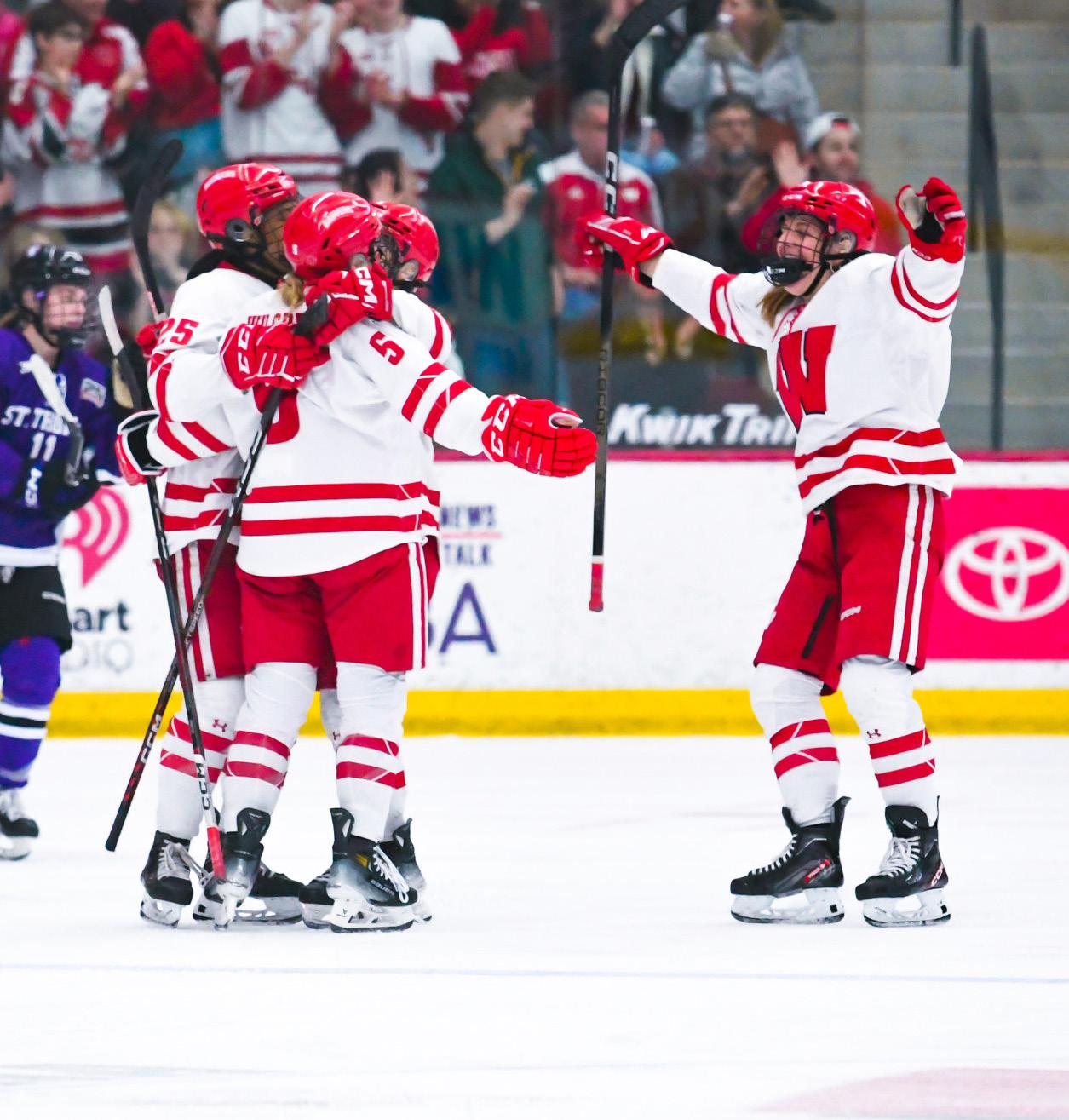
ted the puck between the St. Thomas goalie. Curl’s goal was the lone score in the first period, but the Badger offense heated up in the second.
Eden, O’Brein, Anna Wilgren and Jungels all scored in the second period to give Wisconsin a 5-0 lead.
In the first minute of the third period, Curl’s first-time shot ended up in the back left corner of the net to open the scoring again. Curl later beat two defenders and tallied her second goal of the game, And Katie Kowolski and O’Brein also scored in the third period to close out the 9-1 win
against St. Thomas.
Nine Badgers also made All-Western Collegiate Hockey Association honors teams at the end of the regular season. Simms, O’Brein and Caroline Harvey made the AllWCHA first team, Curl and Eden were recognized on the All-WCHA second team, and Ava Murphy and Laney Potter made the rookie team.
Another border battle showdown will take place next weekend against the Minnesota Golden Gophers in Minneapolis, where the Badgers will play for a spot in the WCHA finals.

AsSelectionSundayapproaches,whatdotheBadgers needtosolidifytheirseedingintheBigDance?
By Levi Cooper STAFF WRITERThis past month has been a rough one for the Wisconsin Badgers men’s basketball team. They were a projected two seed and ranked sixth nationally just a month ago. Today, they are unranked and have fallen to the fifth- or sixth-seed line in March Madness projections.
Being a projected fifth seed with a record of 18-11 is a bit unusual, but the Badgers have a solid resume to back up their poor record. When the committee decides seeds, they use several predictive metrics.
Wisconsin ranks 23rd nationally in KenPom, which measures the adjusted efficiency of each team.
According to KenPom, the Badgers have the 16th-most efficient offense
and the 59th-most efficient defense. If the Badgers want to make a run in March, they will need to clean up on the defensive side. Every national champion except one since 2002 was at least top 21 in offensive efficiency and top 37 in defensive efficiency. The selection committee also likes to look at NET rankings when determining seeds. NET rankings separate games played into four quadrants, with Quadrant 1 being a team’s toughest games: against a top-30 team at home, a top-50 team at a neutral site or a top-75 team away. Quadrant 2 marks the next segments of top-100 teams.
Wisconsin holds six Quadrant 1 wins and six Quadrant 2 wins while also being undefeated in Quadrants 3 and 4.
Additionally, the selection commit-
tee will look at a team’s best wins. Wisconsin holds a home win over Marquette, two wins over Michigan State and neutral site wins over both Virginia and SMU, who each rank top 50 in the NET.
Wisconsin’s home matchup
Thursday against Rutgers is a mustwin if the Badgers want to push for a four-seed. A win at Purdue Sunday would likely boost Wisconsin up to a four seed depending on how they perform in the Big Ten tournament next week.
As of right now, Wisconsin sits at fifth in the Big Ten. If the Badgers want to have a double bye next week in Minneapolis for the Big Ten Tournament as a resume-boosting opportunity, they will likely need to win out in conference play.
